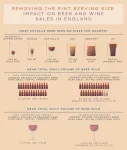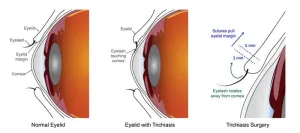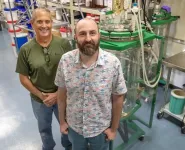Shrinking the pint can reduce beer sales by almost 10%
2024-09-17
(Press-News.org) Reducing the serving size for beer, lager and cider reduces the volume of those drinks consumed in pubs, bars and restaurants, and could be a useful alcohol control measure, according to research published September 17th in the open-access journal PLOS Medicine. Theresa Marteau and colleagues at the University of Cambridge, UK, found that over a short intervention period, venues that removed the pint and offered two third pints instead, sold 10% less beer by volume compared with when pints were available.
When wine by the glass is offered in smaller servings, the amount sold decreases, but similar studies have not investigated the effect on other alcoholic drinks. Marteau and colleagues approached venues in England and asked them to remove the pint serving size and instead offer two thirds as the largest option for four weeks, with four-week non-intervention periods before and after as a comparison.
The team found that removing the pint reduced the daily mean volume of beer, lager and cider sold by 9.7%, although there was a slight increase in the amount of wine purchased, with one pub contributing to half of the increase of wine sales. They report that although customers did not complain, fewer than 1% of venues approached agreed to participate and the intervention involved only 12 establishments.
Further assessment is needed, particularly into whether people fully compensated for reduced beer consumption by drinking other alcoholic drinks, but the intervention merits consideration for inclusion in alcohol control policies. Smaller serving sizes could contribute towards reducing alcohol consumption across populations and thereby decrease the risk of seven cancers and other diseases.
The authors add, “Removing the offer of pints in 13 licensed premises for 4 weeks reduced the volume of beer sold. This is in keeping with the emerging literature showing that smaller serving sizes help us drink less and presents a novel way of reducing alcohol consumption and improving population health.”
#####
In your coverage, please use this URL to provide access to the freely available paper in PLOS Medicine: http://journals.plos.org/plosmedicine/article?id=10.1371/journal.pmed.1004442
Citation: Mantzari E, Hollands GJ, Law M, Couturier D-L, Marteau TM (2024) Impact on beer sales of removing the pint serving size: An A-B-A reversal trial in pubs, bars, and restaurants in England. PLoS Med 21(9): e1004442. https://doi.org/10.1371/journal.pmed.1004442
Author Countries: United Kingdom
Funding: The work of this report was funded in whole by Wellcome [PI: TMM: ref 206853/Z/17/Z (Collaborative Award in Science: Behaviour Change by Design: Generating and Implementing Evidence to Improve Health for All)]. The funders had no role in the study design, data collection and analysis, decision to publish, or preparation of the manuscript.
END
[Attachments] See images for this press release:


ELSE PRESS RELEASES FROM THIS DATE:
2024-09-17
Lower socioeconomic status is associated with higher rates of death from coronary artery disease compared to higher socioeconomic status, and more than half of the disparities can be explained by four unhealthy behaviors. Dr. Yachen Zhu of the Alcohol Research Group, U.S., and Dr. Charlotte Probst of the Centre for Addiction and Mental Health, Canada, report these findings in a new study published September 17th in the open-access journal PLOS Medicine.
Coronary artery disease, also known as coronary heart disease or ischemic heart disease, occurs when the arteries supplying the heart cannot deliver enough oxygen-rich blood due to plaque buildup, and is a major cause of death in the ...
2024-09-17
Trachomatous trichiasis, a potentially blinding condition where inward-turned eyelashes scratch the front of the eye, can successfully be treated by either of the two most common types of eyelid surgery, according to findings from a large comparison trial funded by the National Institutes of Health. In light of previous, smaller studies, which suggested that one of the commonly used surgery types had poorer outcomes, this study provides reassurance that either technique can treat the condition. The study, published in PLOS Neglected ...
2024-09-17
DETROIT — A grant from the National Institutes of Health will support ongoing research at Wayne State University investigating the consequences environmental factors may have on fertility in males.
The five-year, $3,082,404 grant from the National Institute of Environmental Health Sciences of the National Institutes of Health is led by Richard Pilsner, Ph.D., professor and the Robert J. Sokol, M.D., Endowed Chair of Molecular Obstetrics and Gynecology in the C.S. Mott Center for Human Growth and Development in the department of Obstetrics/Gynecology at Wayne State, and faculty member in the Institute of Environmental ...
2024-09-17
WASHINGTON (September 17, 2024) – Children’s National Hospital, widely recognized for its expertise and innovation in pediatric care, has been chosen by the Biomedical Advanced Research and Development Authority (BARDA) to lead the Special Populations Hub in the next generation of the BARDA Accelerator Network. BARDA, is part of the Administration for Strategic Preparedness and Response (ASPR) within the U.S. Department of Health and Human Services (HHS).
The next generation of the BARDA Accelerator Network builds on lessons learned from the first iteration of the network ...
2024-09-17
Norway introduced its Regular GP Scheme was introduced in 2001. This gave all citizens the right to choose a GP in their home municipality and facilitates personal continuity between the doctor and the patient.
These types of long-term doctor-patient relationships are associated with reduced use of emergency health services and lower mortality, both internationally and in Norway.
A widely discussed Norwegian study from 2022 showed that patients who had the same GP for more than fifteen years had a 25 per cent lower risk of dying compared to patients who had the same GP for one year or less.
However, there has been an increasing shortage of GPs in recent years. As of July 2024, just over ...
2024-09-17
Cancer cells seldom start off stealthy. Quite to the contrary, they announce their presence to the immune system by planting chemical red flags right on their membranes. Once alerted, the body’s defenses can swoop in, destroying rogue cells before they can do much damage. Lying at the heart of this early warning system are lipids, fatty compounds previously seen by cancer biologists primarily as a fuel source for burgeoning tumors.
But now, a new study in Nature demonstrates that one particular lipid type is actually ...
2024-09-17
The spacecraft bus that will deliver NASA’s Nancy Grace Roman Space Telescope to its orbit and enable it to function once there is now complete after years of construction, installation, and testing.
Now that the spacecraft is assembled, engineers will begin working to integrate the observatory’s other major components, including the science instruments and the telescope itself.
“They call it a spacecraft bus for a reason — it gets the telescope to where it needs to be ...
2024-09-17
A $5.3 million National Institutes of Health grant awarded to the University of Oklahoma Health Sciences will support advanced cancer research in Oklahoma. The Centers of Biomedical Research Excellence (COBRE) grant is designed to build research capacity and help early-career researchers establish independently funded laboratories.
This is the third and final phase of the COBRE grant, which was first awarded in 2012, followed by phase two in 2017. The grant has supported and paralleled the growth of OU Health Stephenson Cancer Center, Oklahoma’s ...
2024-09-17
COLUMBUS, Ohio – For many decades, the coca plant – the main ingredient in cocaine – has been grown almost exclusively in South America. But a new study shows that nearly half of northern Central America appears to be highly suitable for cultivating this lucrative cash crop.
Findings showed that 47% of Honduras, Guatemala and Belize have the right climate and soil for commercial coca growing. Most of southern Central America was not suitable.
It’s not a hypothetical concern. Researchers began ...
2024-09-17
SAN ANTONIO — September 17, 2024 —Southwest Research Institute (SwRI) is collaborating with The University of Texas at San Antonio (UTSA) to explore and develop a novel platform or chemical process for synthesizing antibiotic compounds with a $125,000 grant. The project, one of two winning proposals this cycle, is supported by the Connecting through Research Partnerships (Connect) program designed to foster collaboration between SwRI and UTSA.
“SwRI and UTSA will work together to combat the growing threat antimicrobial resistance poses to global health by developing a proof-of-concept platform to potentially create a whole ...
LAST 30 PRESS RELEASES:
[Press-News.org] Shrinking the pint can reduce beer sales by almost 10%








